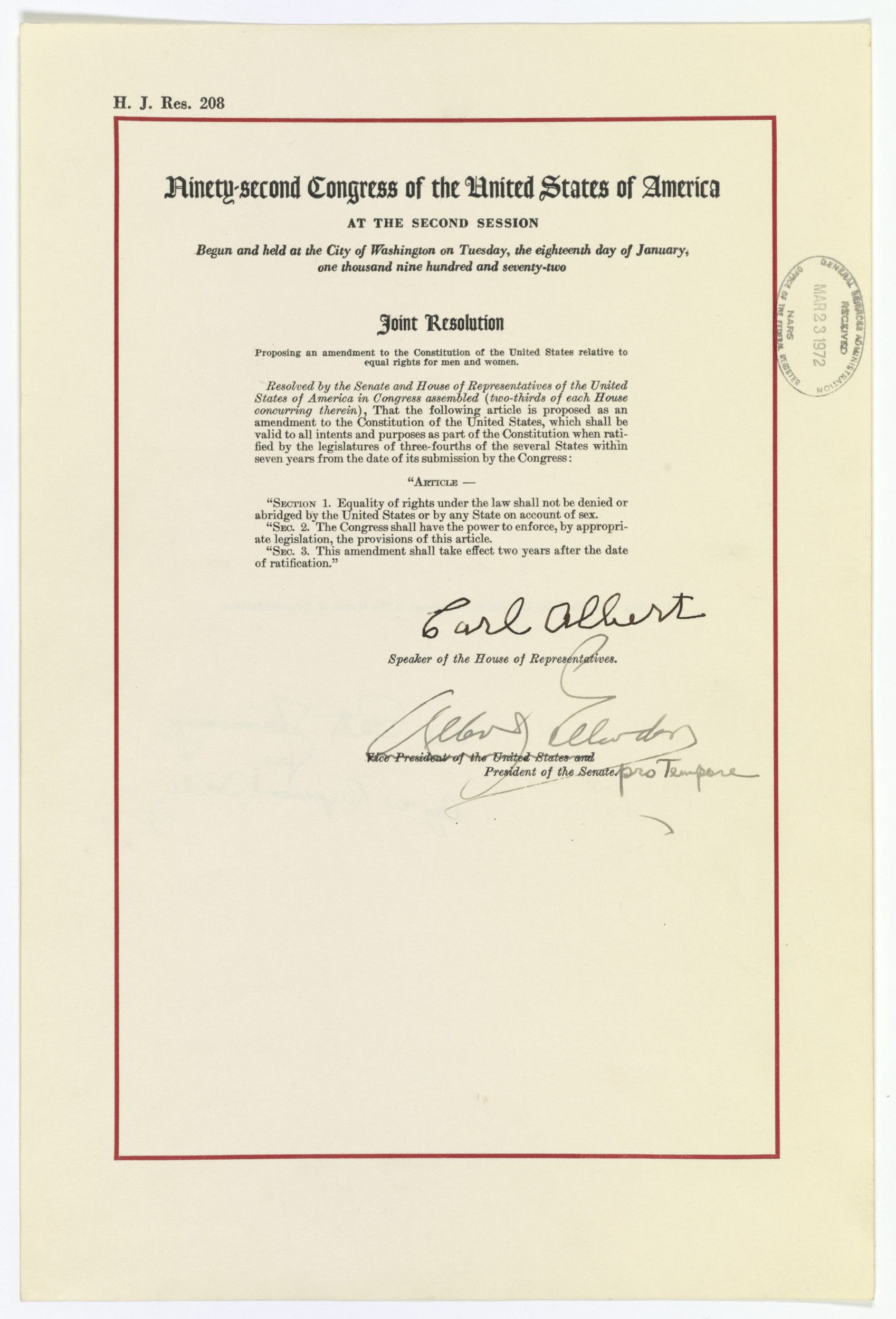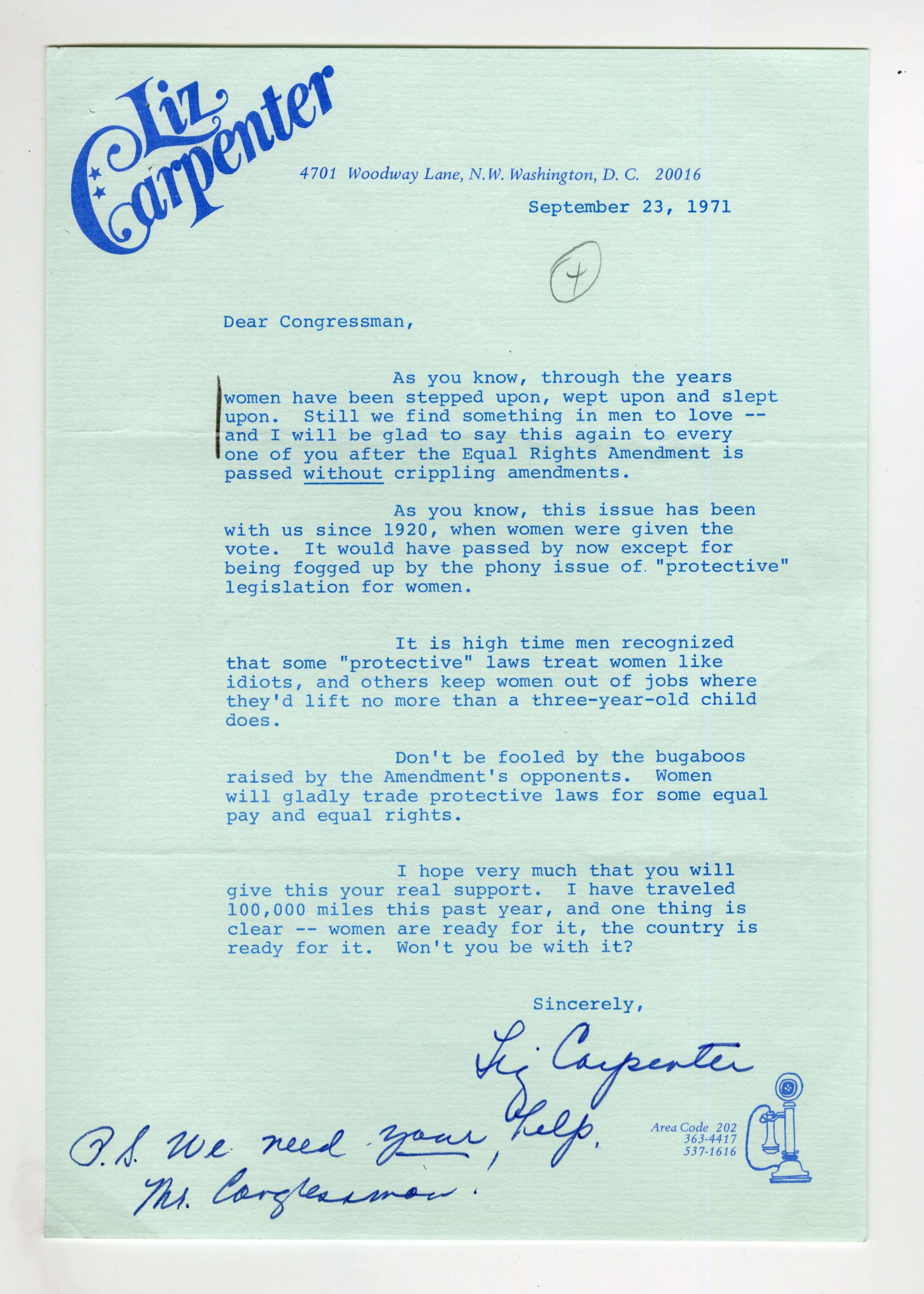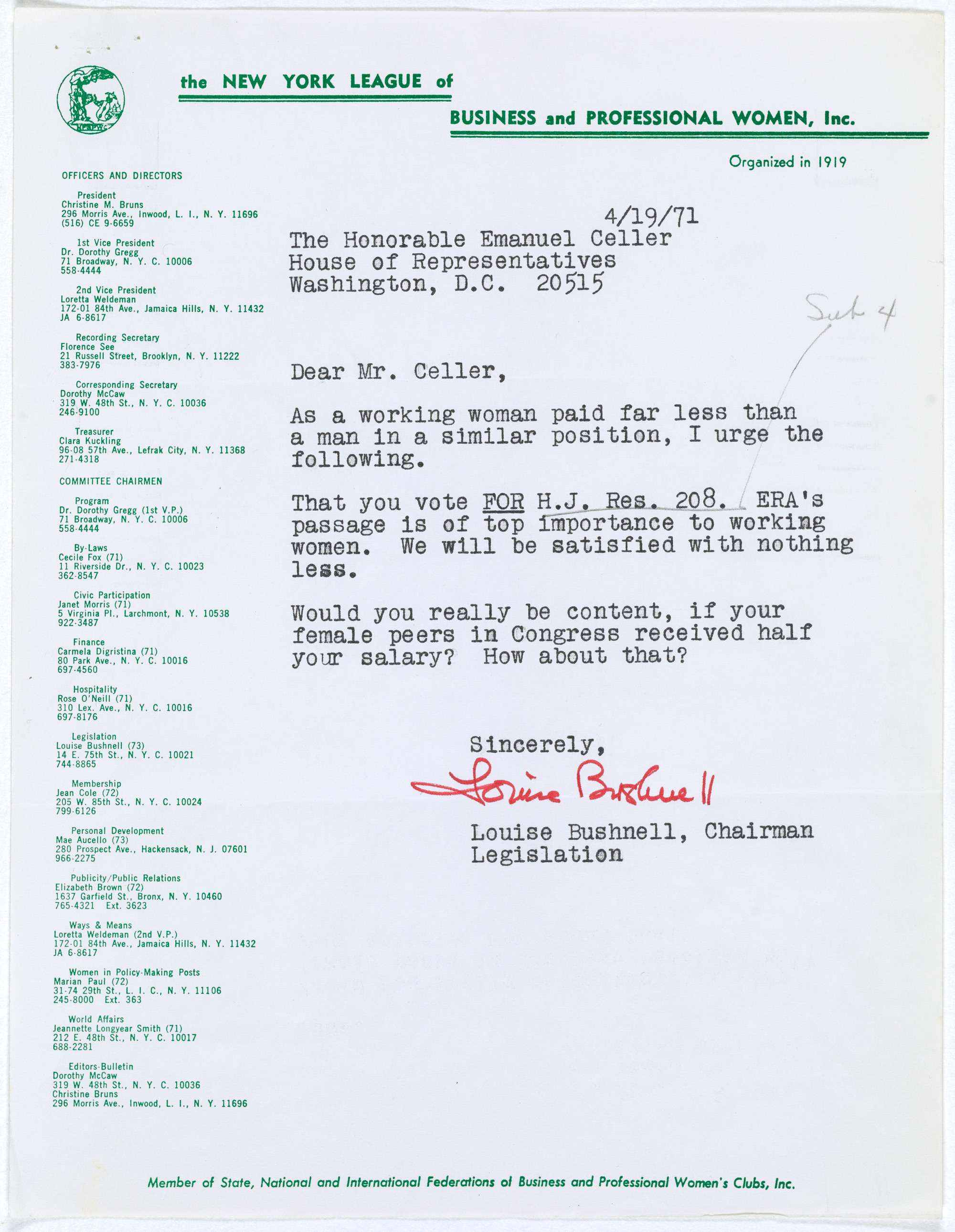Equal Rights Amendment Arguments
Making Connections
All documents and text associated with this activity are printed below, followed by a worksheet for student responses.Introduction
The Equal Rights Amendment was first introduced in Congress in 1923 by Susan B. Anthony’s nephew, Congressman Daniel R. Anthony. Drafted by Alice Paul and Crystal Eastman, leaders in the fight for women’s rights, it was proposed as a way to end discrimination against women. This Constitutional amendment was reintroduced at every subsequent session of Congress for 49 years.
Read the following letters related to the Equal Rights Amendment—some written in support of its passage and ratification and others opposed. As you read, please note the following:
- Who wrote it? Who received it?
- What arguments does it make in favor of or against the Equal Rights Amendment?
Name:
Class:
Class:
Worksheet
Equal Rights Amendment Arguments
Making Connections
Examine the documents and text included in this activity. Fill in any blanks in the sequence with your thoughts and write your conclusion response in the space provided.Joint Resolution of March 22, 1972, 86 STAT 1523, Proposing an Amendment to the Constitution of the United States Relative to Equal Rights for Men and Women

For each of the letters, answer the following in the blank text box that follows each document.
• Who wrote it? Who received it?
• What arguments does it make in favor or against the Equal Rights Amendment?
• Who wrote it? Who received it?
• What arguments does it make in favor or against the Equal Rights Amendment?
Letter from John J. McCreary to Congress Against the Equal Rights Amendment

Enter your response
Letter from Liz Carpenter in Support of the Equal Rights Amendment

Enter your response
Letter from New York League of Professional Women to Congress in Favor of the Equal Rights Amendment

Enter your response
Letter from Representative Shirley Chisholm to Chairman of the House Judiciary Committee Don Edwards

Enter your response
Letter to Representative Don Edwards from Mrs. Thomas Zeko Opposed to the Equal Rights Amendment

Enter your response
STOP ERA Letter from Phyllis Schlafly

Enter your response
1
Activity Element
Joint Resolution of March 22, 1972, 86 STAT 1523, Proposing an Amendment to the Constitution of the United States Relative to Equal Rights for Men and Women
Page 1

2
Activity Element
Letter from John J. McCreary to Congress Against the Equal Rights Amendment
Page 1

3
Activity Element
Letter from Liz Carpenter in Support of the Equal Rights Amendment
Page 1

4
Activity Element
Letter from New York League of Professional Women to Congress in Favor of the Equal Rights Amendment
Page 1

5
Activity Element
Letter from Representative Shirley Chisholm to Chairman of the House Judiciary Committee Don Edwards
Page 1

6
Activity Element
Letter to Representative Don Edwards from Mrs. Thomas Zeko Opposed to the Equal Rights Amendment
Page 1

7
Activity Element
STOP ERA Letter from Phyllis Schlafly
Page 1

Conclusion
Equal Rights Amendment Arguments
Making Connections
Based on the arguments given in the letters above, answer the following.- Which argument in favor of the Equal Rights Amendment did you find the most persuasive?
- Which argument against the Equal Rights Amendment did you find the most persuasive?
- What arguments do you think people would make today in favor of or against the Equal Rights Amendment?
Your Response
Document
Joint Resolution of March 22, 1972, 86 STAT 1523, Proposing an Amendment to the Constitution of the United States Relative to Equal Rights for Men and Women
3/22/1972
The Equal Rights Amendment was first introduced in Congress in 1923 by Susan B. Anthony’s nephew, Congressman Daniel R. Anthony. Drafted by Alice Paul, a leader in the fight for women’s rights, it was proposed as a way to end discrimination against women.
This Constitutional amendment was reintroduced at every subsequent session of Congress for 49 years. Supporters believed it would provide full equality for women; opponents considered it unnecessary, and some believed it destructive of the family.
In 1972 the amendment passed both houses of Congress and was submitted to the State legislatures on March 22, 1972 for ratification. (The joint resolution, a formal opinion adopted by both houses of the legislative branch, is shown here. A constitutional amendment must be passed as a joint resolution before it is sent to the states for ratification.)
When the deadline for ratification by the state legislatures passed in 1982, It was three states short of the required 38 (three-fourths of the States). It remains unratified.
This Constitutional amendment was reintroduced at every subsequent session of Congress for 49 years. Supporters believed it would provide full equality for women; opponents considered it unnecessary, and some believed it destructive of the family.
In 1972 the amendment passed both houses of Congress and was submitted to the State legislatures on March 22, 1972 for ratification. (The joint resolution, a formal opinion adopted by both houses of the legislative branch, is shown here. A constitutional amendment must be passed as a joint resolution before it is sent to the states for ratification.)
When the deadline for ratification by the state legislatures passed in 1982, It was three states short of the required 38 (three-fourths of the States). It remains unratified.
This primary source comes from the General Records of the United States Government.
National Archives Identifier: 7455549
Full Citation: Joint Resolution of March 22, 1972, 86 STAT 1523, Proposing an Amendment to the Constitution of the United States Relative to Equal Rights for Men and Women; 3/22/1972; H.J. Res. 208, 27th Amendment [Proposed 27th Amendment]; Enrolled Acts and Resolutions of Congress, 1789 - 2011; General Records of the United States Government, ; National Archives Building, Washington, DC. [Online Version, https://docsteach.org/documents/document/equal-rights-amendment, May 13, 2024]Joint Resolution of March 22, 1972, 86 STAT 1523, Proposing an Amendment to the Constitution of the United States Relative to Equal Rights for Men and Women
Page 1

Joint Resolution of March 22, 1972, 86 STAT 1523, Proposing an Amendment to the Constitution of the United States Relative to Equal Rights for Men and Women
Page 2

Document
Letter from John J. McCreary to Congress Against the Equal Rights Amendment
8/19/1972
Attorney John J. McCreary sent this letter to Congressman Emanual Celler. He lists the types of laws that protect women that would be nullified if the ERA were to be ratified.
This document was digitized by teachers in our Primarily Teaching 2017 summer workshop in Washington, D.C.
This document was digitized by teachers in our Primarily Teaching 2017 summer workshop in Washington, D.C.
This primary source comes from the Records of the U.S. House of Representatives.
National Archives Identifier: 24746982
Full Citation: Letter from John J. McCreary to Congress Against the Equal Rights Amendment; 8/19/1972; Legislative Files of the Committee on the Judiciary for the 92nd Congress; Committee Papers, 1813 - 2011; Records of the U.S. House of Representatives, ; National Archives Building, Washington, DC. [Online Version, https://docsteach.org/documents/document/celler-mccreary, May 13, 2024]Letter from John J. McCreary to Congress Against the Equal Rights Amendment
Page 1

Letter from John J. McCreary to Congress Against the Equal Rights Amendment
Page 2

Letter from John J. McCreary to Congress Against the Equal Rights Amendment
Page 3

Document
Letter from Liz Carpenter in Support of the Equal Rights Amendment
9/23/1971
Liz Carpenter, Lady Bird Johnson's White House press secretary, sent this letter to Congressman Don Edwards in support of the Equal Rights Amendment (ERA). Edwards wrote a document called "Liz Carpenter Seeks Passage of Equal Rights Amendment Without the Wiggins Amendment" requesting to insert the letter into the Congressional Record.
Introduced in Congress more times than any other proposed amendment, the ERA would have provided for legal gender equality if it had been ratified by the states. Opponents of the ERA argued that it would nullify laws that “protected” women from working long hours or physically challenging jobs. But supporters wanted equal treatment and equal pay regardless.
This document was identified by teachers in our Primarily Teaching 2017 summer workshop in Washington, D.C.
Introduced in Congress more times than any other proposed amendment, the ERA would have provided for legal gender equality if it had been ratified by the states. Opponents of the ERA argued that it would nullify laws that “protected” women from working long hours or physically challenging jobs. But supporters wanted equal treatment and equal pay regardless.
This document was identified by teachers in our Primarily Teaching 2017 summer workshop in Washington, D.C.
This primary source comes from the Records of the U.S. House of Representatives.
National Archives Identifier: 24824217
Full Citation: Letter from Liz Carpenter in Support of the Equal Rights Amendment; 9/23/1971; Legislative Bill Files of the Committee on the Judiciary for the 92nd Congress; Committee Papers, 1813 - 2011; Records of the U.S. House of Representatives, ; National Archives Building, Washington, DC. [Online Version, https://docsteach.org/documents/document/carpenter-era, May 13, 2024]Letter from Liz Carpenter in Support of the Equal Rights Amendment
Page 1

Letter from Liz Carpenter in Support of the Equal Rights Amendment
Page 2

Document
Letter from New York League of Professional Women to Congress in Favor of the Equal Rights Amendment
4/19/1971
Louise Bushnell, Legislation Chairman of the New York League of Business and Professional Women, sent this letter to Congressman Emanuel Celler in favor of the Equal Rights Amendment (ERA). In it she asks: "Would you really be content, if your female peers in Congress received half your salary? How about that?"
This primary source comes from the Records of the U.S. House of Representatives.
National Archives Identifier: 24746981
Full Citation: Letter from New York League of Professional Women to Congress in Favor of the Equal Rights Amendment; 4/19/1971; Legislative Files of the Committee on the Judiciary for the 92nd Congress; Committee Papers, 1813 - 2011; Records of the U.S. House of Representatives, ; National Archives Building, Washington, DC. [Online Version, https://docsteach.org/documents/document/ny-professional-women-era, May 13, 2024]Letter from New York League of Professional Women to Congress in Favor of the Equal Rights Amendment
Page 1

Document
Letter from Representative Shirley Chisholm to Chairman of the House Judiciary Committee Don Edwards
4/14/1971
Congresswoman Shirley Chisholm of New York wrote this letter to Congressman Don Edwards, chairman of the subcommittee responsible for conducting hearings on the Equal Rights Amendment (ERA). She expresses her concern over hearings being held on the ERA, stating that she is "deeply concerned" that many groups who had asked to testify—especially groups representing young women—were not being given the opportunity.
She explains that many groups have come before her complaining that they haven't been allowed to testify, and states they she, herself, wished to testify on the opening day of hearings. She cites a disruption on March 31st by a group of women from George Washington that would not have occurred had they been allowed to testify.
She urged Edwards to "create more understanding of and sympathy for the civil rights of women."
She explains that many groups have come before her complaining that they haven't been allowed to testify, and states they she, herself, wished to testify on the opening day of hearings. She cites a disruption on March 31st by a group of women from George Washington that would not have occurred had they been allowed to testify.
She urged Edwards to "create more understanding of and sympathy for the civil rights of women."
This primary source comes from the Records of the U.S. House of Representatives.
Full Citation: Letter from Representative Shirley Chisholm to Chairman of the House Judiciary Committee Don Edwards; 4/14/1971; Legislative Bill Files of the Committee on the Judiciary for the 92nd Congress; Committee Papers, 1813 - 2011; Records of the U.S. House of Representatives, ; National Archives Building, Washington, DC. [Online Version, https://docsteach.org/documents/document/chisholm-edwards, May 13, 2024]Letter from Representative Shirley Chisholm to Chairman of the House Judiciary Committee Don Edwards
Page 1

Letter from Representative Shirley Chisholm to Chairman of the House Judiciary Committee Don Edwards
Page 2

Document
Letter to Representative Don Edwards from Mrs. Thomas Zeko Opposed to the Equal Rights Amendment
9/9/1971
Mrs. Thomas Zeko sent this letter to Representative Don Edwards in opposition to the Equal Rights Amendment (ERA). The ERA sparked a nationwide debate in the 1960s and 1970s over changing views of the social roles of women. In this letter to her congressman, Mrs. Thomas Zeko expressed her opposition to the ERA. She argues that while women should receive equal pay for equal work, women will not likely find satisfaction when competing with a man for a job: “that a woman will find her fulfillment in competing for some traditionally male position just isn’t so.”
This primary source comes from the Records of the U.S. House of Representatives.
National Archives Identifier: 24824228
Full Citation: Letter to Representative Don Edwards from Mrs. Thomas Zeko Opposed to the Equal Rights Amendment; 9/9/1971; Legislative Files of the Committee on the Judiciary for the 92nd Congress; Committee Papers, 1813 - 2011; Records of the U.S. House of Representatives, ; National Archives Building, Washington, DC. [Online Version, https://docsteach.org/documents/document/edwards-zeko-era, May 13, 2024]Letter to Representative Don Edwards from Mrs. Thomas Zeko Opposed to the Equal Rights Amendment
Page 1

Document
STOP ERA Letter from Phyllis Schlafly
11/18/1974
The Equal Rights Amendment (ERA) sparked a long and divisive struggle when it was introduced. Some believed it would provide full equality for women. Others considered it unnecessary. First proposed in 1923, the ERA would add to the Constitution that women have equal rights with men. It was introduced at every session of Congress until 1972, when it passed both houses and was sent to the states for ratification.
After Congress passed the ERA, lawyer Phyllis Schlafly launched the STOP ERA campaign. Believing the ERA was vague and unnecessary, and that making law gender-neutral was detrimental to families and to the United States, Schlafly fought against the ERA until its final deadline. When the deadline for ratification passed in 1982, the amendment was three states shy of the requisite number of votes.
After Congress passed the ERA, lawyer Phyllis Schlafly launched the STOP ERA campaign. Believing the ERA was vague and unnecessary, and that making law gender-neutral was detrimental to families and to the United States, Schlafly fought against the ERA until its final deadline. When the deadline for ratification passed in 1982, the amendment was three states shy of the requisite number of votes.
This primary source comes from the Collection GRF-0059: White House Central Files Name Files (Ford Administration).
Full Citation: STOP ERA Letter from Phyllis Schlafly; 11/18/1974; White House Central Files Name Files, 8/1974 - 1/1977; Collection GRF-0059: White House Central Files Name Files (Ford Administration), ; Gerald R. Ford Library, Ann Arbor, MI. [Online Version, https://docsteach.org/documents/document/stop-era-schlafly, May 13, 2024]STOP ERA Letter from Phyllis Schlafly
Page 1

